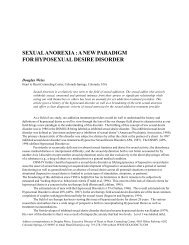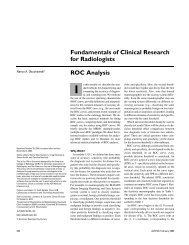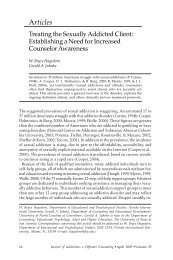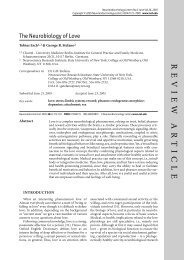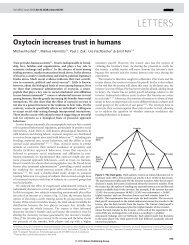An Overview of Psychiatric Ethics
An Overview of Psychiatric Ethics
An Overview of Psychiatric Ethics
Create successful ePaper yourself
Turn your PDF publications into a flip-book with our unique Google optimized e-Paper software.
Normative Ethical Theories and Psychiatry1Apart from this, the ethics <strong>of</strong> care approach to ethics suffers from an inadequate analysis <strong>of</strong> theconcept <strong>of</strong> “care”, which has been argued to be “hopelessly vague”. 146 In lacking a descriptiveor normative account <strong>of</strong> morality, care-related language defines the concept <strong>of</strong> care as beingconstitutive <strong>of</strong> a moral good. This introduces a form <strong>of</strong> prescriptivism, which argues that actions aregood if they are caring. The argument suffers from a suppressed premise that care is constitutive<strong>of</strong> an ethical good. Moreover, the prescriptive argument that ’one ought to care’ is weakened bya fallacy <strong>of</strong> ambiguity – caring about how your football team fares is not the same as care for yourfamily or patients. 147In suggesting the ethics <strong>of</strong> care are a substantive moral philosophy, Held 130 argued that it hasfive defining features. First, “the focus <strong>of</strong> the ethics <strong>of</strong> care is on the compelling moral salience <strong>of</strong>attending to and meeting the needs <strong>of</strong> the particular others for whom we take responsibility (p.10)”.Second, the ethics <strong>of</strong> care value emotions, and appreciate emotions and relational capabilities thatenable morally concerned persons in actual interpersonal contexts to understand what would bebest. Third, the ethics <strong>of</strong> care reject the view that the more abstract the reasoning about a moralproblem, the better. Fourth, the ethics <strong>of</strong> care propose a novel conceptualization <strong>of</strong> the distinctionbetween private and public moralities and <strong>of</strong> their respective importance. Finally, the ethics <strong>of</strong> careadopt a relational conception <strong>of</strong> persons, which is in stark contrast to the rights-based approaches<strong>of</strong> modern liberal individualism.25DISTRIBUTIVE JUSTICEIntroductionUnlike criminal or “retributive” justice, “distributive” justice describes the process <strong>of</strong> the just or fairallocation <strong>of</strong> limited social goods. The World <strong>Psychiatric</strong> Association’s Declaration <strong>of</strong> Madrid (1996)states that “psychiatrists should be aware <strong>of</strong> and concerned with the equitable allocation <strong>of</strong> healthresources”. 148 Several articles in The Lancet have also implored psychiatrists to consider issues <strong>of</strong>149, 150just allocation <strong>of</strong> resources in a global setting as part <strong>of</strong> their ethical obligations.The philosopher John Rawls crafted a conception <strong>of</strong> distributive justice during his career. 151-153Rawls’ approach to justice derived from a hypothetical notion <strong>of</strong> having moral agents conceptualizean “original position”, which was pre-social and pre-historical. The participant in this social contractwould be blinded as to who they were going to be in this future society through a “veil <strong>of</strong> ignorance”.Based on these constraints, the moral agents would then define a just distribution <strong>of</strong> goods in thisfuture “well-ordered society”. Rawls believed that all choosers would operate on the assumptionthat they would end up the least advantaged person in the society and through a process <strong>of</strong>“constrained maximisation”, allocate resources accordingly. Such resources were not merely wealth,but also freedom, mobility <strong>of</strong> labour and equal access to opportunity to achieve fulfilment in life. Thisapproach to justice assumed first, all participants would act out <strong>of</strong> self-interest and, secondly, be riskaverse and conclude that assuming worst case scenarios was the safest approach. Whilst the firstassumption is reasonable, the second may not reflect how all people might approach the problem.In stark contrast to Rawls’ liberal egalitarianism was the free-market libertarian ideas <strong>of</strong> RobertNozick, 154 who averred that the only constraint the state should place on the free exchange <strong>of</strong>resources within a society should be to ensure he legitimacy <strong>of</strong> the acquisition and subsequentexchanges <strong>of</strong> property. Libertarianism has become the dominant paradigm in post-industrialdeveloped economies and many health systems have evolved based upon the principles <strong>of</strong> suchfree exchanges <strong>of</strong> goods and services between individuals.Rawls’ Theory and Mental HealthWhilst Rawls’ contractarian method was ingenious, there are problems with what he defined as“social goods”. Rawls saw that all members <strong>of</strong> a well ordered society had equal entitlement toaccess social goods to have the opportunity to live fulfilling lives. Rawls took the Kantian view thatindividual fulfilment is a product <strong>of</strong> autonomy, or rational self-governance. As such, social goods areinstrumental in achieving this, and the just distribution <strong>of</strong> these social goods assists members <strong>of</strong>society to achieve this autonomous existence. As Nussbaum points out, such an approach falterswhen we consider the situation <strong>of</strong> those whose capacity for autonomy is impaired life-long. A personwith disabling chronic schizophrenia may never be truly capable <strong>of</strong> autonomy and so their needs areIMET AN OVERVIEW OF PSYCHIATRIC ETHICS



